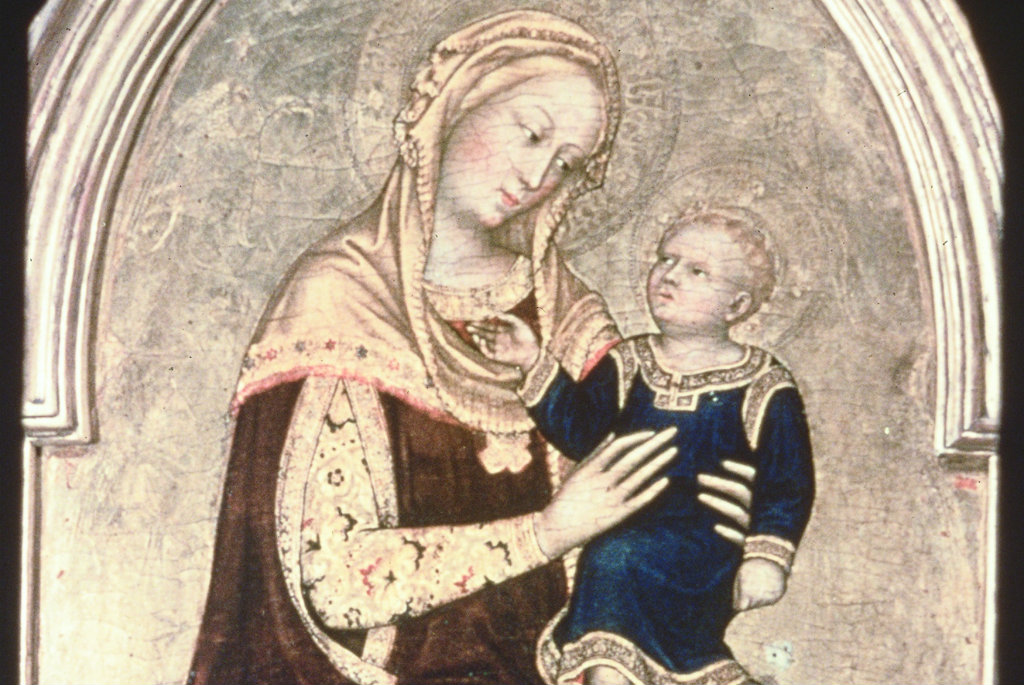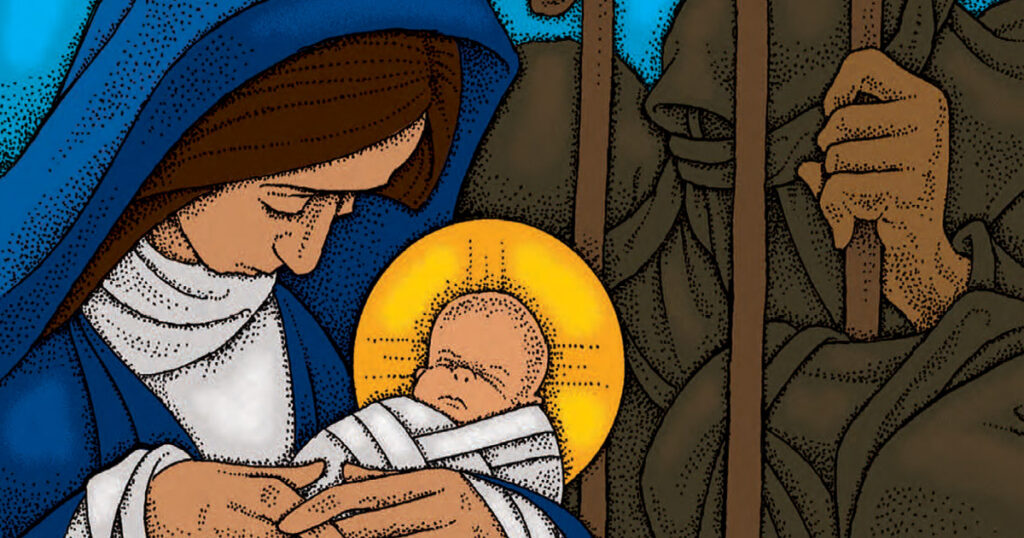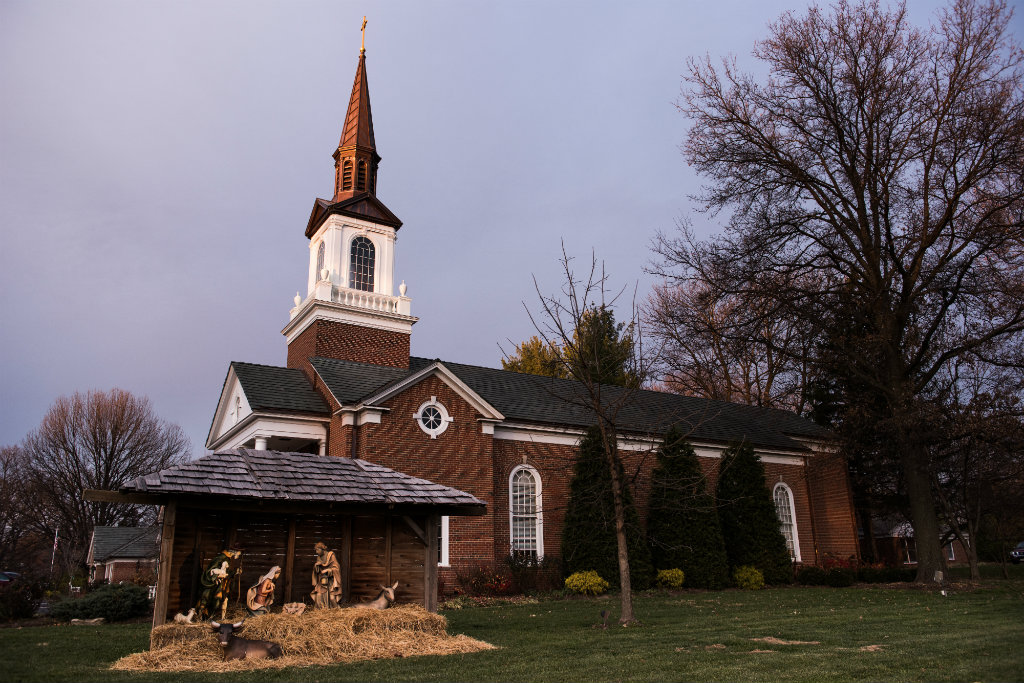by William Weedon
Whatever are Lutherans to make of Mary?
Looking around at the contrary approaches to Mary that other church traditions take, it’s easy to be confused. At times it seems that Christians in the Eastern Orthodox and Roman Catholic churches elevate Mary almost to the status of a goddess. They pray to her, sing hymns to glorify her and even commend their souls into her keeping at death. On the other hand, many Protestant Christians believe her to be “just like us” — nothing special. That surely is not right either. After all, who among us has been visited by an archangel and been declared highly favored of God? Who among us has conceived a child by the power of the Holy Spirit and given birth to the long-promised Savior, the eternal Son of God? Nothing about this screams “just like us.”
So is there a third way? Yes.
Before we can identify that third way, however, it is important to understand that the contrary teachings about Mary we see all around us today have their roots not in the Bible, but in some extra-biblical traditions that arose in the history of the Church.
Mary in the Early Church
In the early years of the Church, there was no apparent devotion to the Virgin Mary. There was, however, a growing theological reflection upon Mary’s role in the salvation narrative. She was frequently depicted in sermons as a “new Eve,” and her faithful obedience to the angel’s message was seen as a counterpoint to Eve’s disobedience. In the art of the catacombs she was often depicted praying, her hands raised in pious supplication. The idea of her perpetual virginity was also beginning to take firm root in the minds of the faithful, but there was still plenty of room for diverging opinions on this question.
Reflection on Mary grew with intensity as the Church began to hammer out the language of the two natures in Christ. By the third great ecumenical council, held at Ephesus in 431, Mary was very much a topic of discussion. Was she just the mother of the human Jesus, or the very Mother of God (Theotokos, God-bearer)? The Church came down solidly on the latter interpretation. By this, the Church Fathers were not saying or implying that Mary was eternal or divine in her own right. Nonetheless, they affirmed that to call Mary the Mother of God was thoroughly biblical. After all, as Isaiah had foretold in chapter 7, she is the mother of Immanuel, God-with-us. She conceived and bore in her womb and fed at her breasts God the Son, eternally begotten of His Father but born in time of His mother, from whom He received a human nature by the miraculous working of the Holy Spirit.
Mary in the Middle Ages
As time passed, the traditions surrounding the Virgin and her place in Christian devotion and piety continued to expand, and these practices gradually moved from private piety and speculation into public worship. Beginning with the churches of the eastern half of the empire but later spreading also into the West, prayers and hymns began to be offered to Mary in various liturgies. The picture that took firm hold in the hearts of the faithful during the High Middle Ages was of Christ as a stern and forbidding judge who needed to be appeased and made kind toward us. His mother was thought to be the one for the job. Mother Mary thus became a refuge for sinners, who fled to her and begged her to implore her Son on their behalf — to “pray for us sinners now and at the hour of our death,” as Catholics repeat to this day in the Rosary. Hand in hand with the invocation of the Virgin came the teaching that she was granted by her Son an early resurrection and enthroned at His side as the Queen of Heaven. This is the tradition of Mary’s Assumption that came to be celebrated on August 15th. The notion that Mary was conceived without original sin arose also, though not without some significant opposition.
Reform and Reaction
During the Reformation, Lutherans and Protestants alike sought to critique and rein in the unscriptural elements of medieval devotion to Mary. Some of the more radical reformers even destroyed all statuary and pictures of Mary (and of the other saints and even of Christ Himself) and pretty much scrubbed her from their piety entirely. “She’s just like us,” was their thought. “Nothing special about her.” It’s sadly true that this more radical approach came to influence later generations of Lutherans. Just ask yourself: Among all the St. Peter and St. Paul and even St. James Lutheran churches, have you ever noticed a St. Mary Lutheran Church in your neighborhood?
The Lutheran approach, however, as witnessed in the Book of Concord, differed from that of those more radical reformers from the start. While acknowledging and eliminating the abuses attached to devotion to Mary and the other saints, early Lutherans still envisioned a place in the Church of the Augsburg Confession for a positive remembrance of all the saints, including the Virgin Mary. Thus Lutherans continued to celebrate the memory of the Virgin Mary in the chief feasts associated with her: Annunciation, Visitation, Purification and, of course, Christmas. The non-biblical feast of the Assumption was largely discontinued in Lutheran use (and where it did remain, it was redirected, as in our own hymnal where it simply commemorates the traditional day of her death). All invocation of the Virgin or any other saint was set completely aside; Lutherans prayed, as we still do, to the Triune God alone. All nonsense about saintly merit was discarded by the Lutheran reformers without question, even as they continued to honor Mary in a biblical way.
A Lutheran View of Mary
How, then, should Lutherans view Mary today? Through the Bible, of course!
In the Gospels, we learn that this young virgin, betrothed to a carpenter named Joseph, was a descendent of King David. Before the betrothed couple came together, the angel Gabriel announced to Mary that she would conceive and bear a Son and call His name Jesus. In great faith, Mary responded to the angel’s words: “Behold, the handmaid of the Lord. Let it be to me according to your word.”
After the angel left her, Mary made her way into the hill country of Judea and arrived at the house of Zechariah and Elizabeth. As Mary called out a greeting, John the Baptist in Elizabeth’s womb leaped for joy and Elizabeth cried out in amazement: “Blessed are you among women and blessed is the fruit of your womb! And why is this granted to me that the mother of my Lord should come to me? … And blessed is she who believed that there would be a fulfillment of what was spoken to her from the Lord” (LUKE 1:42–45). Shortly thereafter Mary herself prophesied: “For behold, from now on, all generations will call me blessed; for he who is mighty has done great things for me” (LUKE 1:48, 49). It has thus been a pious custom ever since — and one that Lutherans can certainly embrace — for Christians to speak of Mary as “the Blessed Virgin.”
Mary speaks of people calling her blessed not because she is great or has done great things, but because God her Savior has done great things for her. Elizabeth specifically calls Mary blessed because she believed what God said; this in contrast to her husband Zechariah, who doubted the angel’s words and was stricken with nine months of muteness! Many years after the events in Luke 1, a woman would cry out to Jesus: “Blessed is the womb that bore you and the breasts at which you nursed!” To which He replied: “Blessed rather are those who hear the word of God and keep it!” (LUKE 11:27, 28). In saying this, Jesus was not disrespecting his mother, but He was making sure we don’t miss out on what made His mother truly blessed: not merely that she was privileged to give birth to Him, but rather, that her deepest blessedness came when God spoke His promise to her and she believed it — and not only believed it, but kept and “treasured up all these things, pondering them in her heart” (LUKE 2:19; 2:51).
All of this means that Mary is the virgin mother foretold in Isaiah 7:14. She is the Mother of Immanuel, the Mother of God-with-us. This, of course, is not saying that she herself is divine, or eternal, or anything at all like that. We confess instead that this truly human creature, who freely admitted herself in need of a Savior (LUKE 1:47), was chosen by God’s grace to become the mother of the Eternal Word. She really is the Mother of God. God the Eternal Word took on flesh in her womb, nursed at her breasts and was swaddled in the warmth of her embrace.
Mary is not, then, “contrary” to our confession. As Lutherans, we remember her and thank God for her life. We find our own faith strengthened when we ponder the way God’s grace worked in her. We certainly want to imitate her joyous “yes” to the will of God and her holding tight to the words and promises she heard.
Fittingly, Mary’s last recorded words in the Bible are, “Do whatever He tells you” (JOHN 2:5). In this, Mary sets a fine example for us to follow — one that invites us all to trust in her Son’s love and join the psalmist in crying out: “Not to us, O Lord! Not to us but to Your name be glory” (PS. 115:1).
The Rev. William Weedon is director of worship for The Lutheran Church—Missouri Synod and author of Thank, Praise, Serve, and Obey: Recover the Joys of Piety (new this month from CPH).
This article originally appeared in the December 2017 print edition of The Lutheran Witness.






It is Biblical to say that Mary was a virgin when she conceived and bore Christ. It is not Biblical to say she was forever a virgin. Mary had a husband and additional children. She did not remain a virgin forever.
Excellent article. Indeed, the blessed Virgin Mary is the Mother of God and she is to be venerated for her faithfulness to God and her role in salvation history.
I have seen it stated elsewhere that Lutherans confess Mary as “Mother of God” but I would like to know (1) if this is really true officially and (2) if its in the Book of Concord and where or (3) is it just some Lutheran taking advantage that in some early writing of Luther outside the Book of Concord he continued to use this language similar to how in the 95 Thesies he still believed in the papacy?
Why so much confusion unless one does not believe the Bible, which says there is one mediator, Jesus. Note the Hail Mary of the Roman Catholic Church……protect us now and at the hour of our death. Amen. Mary is dead and not the deity ….neither our Savior or one we are to pray to.
I did not come to know what it really means to be a Christian until I was in my 30’s. A Lutheran pastor lived next door and invited me to his church. I was also invited to join their bible study and that’s when my life changed. I was raised in a works-righteous religion and like Luther, never felt good enough. I could never say enough prayers or offer sacrifices to feel worthy of God’s love. The scriptures spoke to me and I finally understood. Jesus said, “I am the way and the truth and the life. No one comes to the Father except through me.” John 14:6 “For by grace you have been saved through faith. And this is not of your own doing, it is the gift of God, not a result of works, so that no one may boast.” Ephesians 2:8-9 It’s that simple. There’s no mention of saints, or Mary, or anything else.
Mary was not only chosen by God to give birth to Jesus but to be his human mother also. Being devout in the Hebrew faith she would raise him in the nurture and admonition of the Lord (think, spiritually, God knew this when he picked her?). The Son of God in Jesus didn’t need this but the Son of Man did (Hebrews 2:17&18). The perfect mind of Christ in Jesus kept him from sinning. Christians strive to have this perfected mind of Christ
(1 Corinthians 2:16, Philippians 2:5) .
So Mary’s job was to be the mother of Jesus the human (Son of Man). Not to raise the Son of God or tell anyone who he was until His time had come, these things were between God the Father (whom Jesus says he listens to in several places in scripture) and Jesus Christ.
This is brought out in recorded scripture encounters between Jesus and Mary and by the reaction of Jesus’s Nazareth neighbors and His siblings as to who He was or wasn’t.
Encounter 1. The boy Jesus in the temple (Luke 2;41-52). Here Mary is doing her justified frustrated mom thing chewing out her puberty 12 yr old (human) son for making them worry. Typical natural behavior 12yr old boy thing to show off how much He already knows. What is interesting is how some say Mary forgot that Jesus was God’s son. Mary didn’t forget who He is, she knew full well who He is she pondered those things in her heart-ingrained them – remember. They get this from Luke 2:50 “And they did not understand the saying that He spoke to them.” It wasn’t that Mary didn’t get the gist of what He was saying, she knew she wasn’t finished doing what God had assigned her to do, raise the boy in the nurture and admiration of the Lord, and she expected Him to toe the line. What she didn’t understand is why He was saying this now. Jesus got the message also Luke 2:51 “And he went down with them and came to Nazareth and was submissive to them. And his mother treasured up all these things in her heart.” God spoke through Mary, it wasn’t time for the Son of God to come out, and Jesus knew it – “Honor your father and your mother, that your days may be long…”
Encounter 2.The wedding at Cana; John 2:1-11. This occurred after Jesus had been baptized, John announced Him as the Lamb of God and Jesus started picking up his disciples. Mary would have known about this because she was at the wedding as well with Jesus and his new disciples.
It was now apparent that Jesus, after 30 yrs, was launching his ministry. Now Mary who hadn’t said a peep to anyone about Jesus being the Son of God felt inspired to tell Jesus the party was running out of wine. We know from scripture Mary didn’t tell her neighbors in Nazareth or even her other children (Mathew 13:55-57) that Jesus was also the Son of God – they had no clue. It is apparent Mary brought up Jesus in the same manner as his siblings not showing favoritism.
So this time, Jesus tells her ‘my time has not yet come’ but at 12 he was ready to rip! Mary follows her inspiration and tells the servants do what ever he tells you. Again God speaks through Mary. Jesus gets the message and now knows it is time to come out. He tells the servants to pour water into the water jars, the water becomes wine, and he tells them to serve the wine.
Encounter 3. (Mark 3:1-6) Sometime after the Pharisees started plotting with the Herodians against Him, how to destroy Him, Jesus was speaking to a crowd in His home town. Where they were already questioning the truthfulness of Him. “And when His family heard it, they went out to seize Him, for they were saying, “He is out of his mind.”Mark 3:21. They were afraid for His safety, many influential people were plotting to destroy Him
Many read this and think Mary and his brothers thought Jesus was crazy without reading the preceding text and other threatening text against Jesus. In Mark 3: 31-35 He is letting His mom know that this is His mission He now belongs to all who will accept Him not just to them. He is now totally in God the father’s hands as to what will happen to Him she needs to let go now and let God.
Encounter 4. From the cross Jesus spoke His last words to His mother and told John to take care of Her (John 19: 25-27). He now returned the blessing to His mom for the many blessings she gave Him in raising Him.
From the humbleness, praise and understanding of what God has done not only for her but all mankind, expressed in her Magnificat (Luke 1:46-55), we know Mary clearly understood her place in God’s grand plan:
Luke 1:
46 And Mary said,“My soul magnifies the Lord,
47 and my spirit rejoices in God my Savior,
48 for He has looked on the humble estate of His servant.
For behold, from now on all generations will call me blessed;
49 for He who is mighty has done great things for me,
and holy is His name.
She was God’s good and faithful servant and rejoiced in the opportunity not only to give birth to Jesus but to be his mom. There was a great, special, loving and understanding relationship between God the Father, Jesus Christ and Mary. This is her unique blessing through time and the life she now enjoys with God her savior Amen.
Catholics don’t pray to Mary. Catholics ask Mary to intercede on their behalf with God. It is nuanced, but there is a difference
Jake, it is still wrong to ask Mary to “intercede” for us, when we are supposed to pray directly to the Lord ourselves. As a former Catholic, raised and educated for 9 years of parochial school education, I questioned some of the doctrines I was being taught, and one thing very troubling was the idea of praying to various saints and Mary to intercede for me at times of trial. One example and a personal anecdote is this: I was once a 22 year old Marine sent to South Vietnam and assigned to a small outpost in a rural district. I had been in-country for only one week. I was part of a small unit of Marines and Army Advisors augmented by local militia types(Vietnamese popular forces). My first combat exposure of my year long tour occurred that first week, with a night attack on our compound by the Viet Cong. As I was returning fire at flashes of enemy small arms and shadows of moving guerrillas in the darkness in front of our fields of fire, I began to say a prayer. I thought to myself, as a Catholic, “Should I ask Mary for help? Should I pray to Saint Jude? Should I pray to Saint Christopher? No….better just go right to the Lord!” Do you see my point? I survived that night and many more engagements by the grace of God. Even if I would have lost my life in that faraway battle, I could not waste my time praying to dead saints for this there intercession on my behalf. I would rather just pray to Jesus. No other name will do.
I’m a former LCMS Lutheran who is now Eastern Orthodox. With respect, do you ask your Christian friends to pray for you? Then why wouldn’t you ask our heavenly friends, Mary and the saints, to pray for you? Our God is the God of the living, not of the dead!
I agree–essentially. But historically, there is a vein with runs through Roman Catholicism which promulgates the idea very well expressed by Mr. Flanagan, that we not only ask these saints to pray for us, but that it is preferable, undercutting a proper Christology. Of course asking earthly friends to pray for us, can do the exact same thing. Imho, the problem is not in the asking, but in the why.
And that’s where I (a nonlutheran, just a wayward Christian) would diverge from Lutheranism. I don’t believe a correction to this roman catholic tradition, requires a total renunciation of, ‘Mary I love you and I know you love me too’. I talk to Mary. I talk to my Dad and Grandmother. I know they all love me and care for me. In Christ, all things are mine, all things in heaven even. I have a real relationship with them, centered in Christ who is ever present. Of course He is! He is never alone! Where they are He is, and where He is, they are! That is my praying-with-Scripture experience.
May God, who is Truth lead us into all Truth
So…calling upon Mary to intercede for them is not prayer??? How then do you define prayer?
Fine article about Mary. I have always had a fondness for Mary and have had a great appreciation for what she did in being the first person to accept Jesus on HIS terms, regardless of any personal cost! I agree with Rev. Weedon, that we should not pray to Mary but honor her as the Mother of God in the flesh! And it would be nice to see a St. Mary’s Lutheran Church someday!
Mary should be remembered and venerated as a special woman who was called by God to give birth to Jesus in His human form. However, Mary never sought to be worshipped nor is it proper or Biblical to elevate her to the level which the Roman church raised her. But then again, the Roman Catholic Church also canonized a multitude of saints and placed them into worship status and even today encourages people to pray to them for intervention and assistance. Also, the Roman church ascribed supernatural powers to holy water and relics of the dried skin and bones of dead saints, going further than the word of God permits. Even the Reformation failed to cause the Roman Church to halt the misguided worship of Mary and the saints.